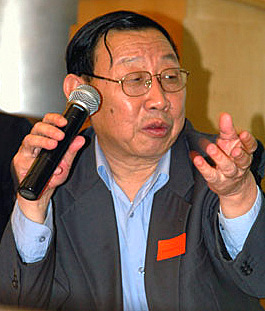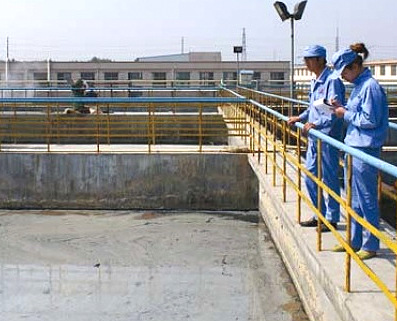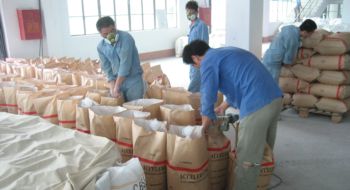'Portuser' contributed this article to NextInsight
The recently-released 2013 annual report of China Sunsine Chemical offers its first-ever environmental and social performance statement.  Xu Cheng Qiu, executive chairman of China Sunsine. NextInsight file photoIt is not a requirement for companies to report on their performance in these areas.
Xu Cheng Qiu, executive chairman of China Sunsine. NextInsight file photoIt is not a requirement for companies to report on their performance in these areas.
Many companies who do so simply state their commitment to be as green and as socially responsible as possible.
But Sunsine’s statement (pages 40-44 of the annual report) provides data on, for example, the reduction in both water consumed and waste water discharged -- and an increase in water recycling.
Sunsine uses tap water in its production processes, and treats the resultant polluted water to acceptable levels before discharging it into water courses.
When further treated, the effluent can become suitable for reuse in its production processes.
The company is the largest producer of rubber accelerators in the world and the largest producer of insoluble sulphur in the PRC. These chemicals are used in tyre manufacturing.
|
In 2013, Sunsine treated 350,000 cubic metres of effluent for reuse, and this cut down its demand of tap water.
In all, Sunsine used 1.02 million cubic metres of water last year (see table).
For perspective, the entire population and industry in Singapore use 1.3 million cubic metres of tap water daily.
It is significant that the 17% increase in the amount of water (both tap water and recycled water) used in 2013 was proportionately less than the 21% rise in the output of goods.  Sunsine's water treatment facility.
Sunsine's water treatment facility.
Photo: annual reportThe company attributed the improvement to the adoption of more advanced production processes and equipment, and the use of cleaner raw materials.
Further treating the effluent for reuse, instead of relying wholly on tap water, also resulted in less effluent being discharged into water courses (525,000 cubic metres in 2013 against 700,000 cubic metres in 2012), lessening the burden on the water body.
Sunsine has been complying with the discharge standards and is grabbing business previously undertaken by rivals who are having difficulty in complying with the discharge standards.
Its extra effort in water conservation is likely to set Sunsine further apart from its rivals and help it to win more business from tyre manufacturers who are concerned about the environmental impact of the manufacturing processes of its own as well as its suppliers.  Rubber accelerators in powder form being packaged by Sunsine workers wearing safety masks. NextInsight file photoAlthough the cost of recycling wastewater may be higher than the tap water tariff saved, there are intangible benefits arising from Sunsine being branded as an entity that goes the extra mile to protect the environment.
Rubber accelerators in powder form being packaged by Sunsine workers wearing safety masks. NextInsight file photoAlthough the cost of recycling wastewater may be higher than the tap water tariff saved, there are intangible benefits arising from Sunsine being branded as an entity that goes the extra mile to protect the environment.
In any case, the company's 2013 profit of RMB 77m was reasonable enough even though it incurred water recycling cost.
Through its environment-protection measures, Sunsine has surged ahead of its competitors in business, as a commentary in the just-released 1Q 2014 results by Sunsine strongly suggests →
|
|
Recent story: 3 S-chips: Strong buying interest by some investors







this is Mr market's response to this type of S-chips...